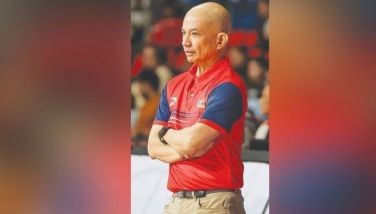What to do in AIBA boxing

MILAN – Surely, there are tons of lessons to be learned from the Philippines’ failure to enter the third round of eliminations at the 15th AIBA World Boxing Championships here.
The five-man Filipino squad finished with a record of three wins and five losses. Lightflyweight Harry Tanamor drew a bye in the first round and lost in his only outing to Armenia’s fifth-seeded Hovhannes Danielyan, 11-3. Bantamweight Joan Tipon decisioned Sri Lanka’s Kamal Gamaethiralalage, 8-3, then dropped a 2-0 heartbreaker to second-seeded Abdelhalim Ouradi of Algeria.
Featherweight Charly Suarez was sensational in crushing Romania’s Julian Stan, 18-8, but crashed out with a whimper, bowing to South Korea’s Joo Min Jae, 11-5. Lightweight Joegin Ladon was the only casualty in the first round as he was victimized by England’s Thomas Stalker, 11-4.
Lightwelterweight Genebert Basadre whipped Pakistan’s Aamir Khan, 5-1, to start off the Philippines’ campaign on a high note but was reduced to a whipping boy by Brazil’s two-time Olympian Myke Carvalho, 10-3, in the second round.
The team’s strong start – three wins in four fights – was forgotten in the wake of a dismal tailspin that saw a string of four straight defeats.
* * * *
National coach Pat Gaspi said two of the five losses could’ve been winning situations for the Philippines. He pointed to Tipon’s setback to Ouradi and Suarez’ disappointing defeat to Joo.
The count was a 0-0 tie entering the third round but Tipon failed to score a single point while Ouradi, a flat-footed standing target, picked up two points before the final bell. Tipon could’ve easily used his quickness to run rings around Ouradi and pepper him with straights from long range. But for some unexplained reason, Tipon said his body wasn’t up to it.
Ouradi, by the way, was coached by a pair of Cubans Luis Arencivia and Rolando Perez.
In Suarez’ case, inexperience was evident. The youngest in the squad at 21, Suarez just didn’t know how to penetrate Joo’s long-armed defense. Gaspi told him what to do but Suarez couldn’t execute. What made the loss more painful was the realization that Suarez’ first round victim, Stan, was a better fighter than Joo.
From watching the Filipinos fight up close, I listed 10 things to keep in mind in AIBA tournaments.
• Leave shadow boxing in the gym. It doesn’t score points in a fight. Besides, throwing punches into the air without landing is exhausting. Tipon did a lot of shadow boxing against Ouradi and never scored a single point.
• Form is dispensable. What counts is the ability to connect. Judges don’t care if a fighter looks good. A fighter like Joo may show awful and awkward form but if he’s accurate and lands more than his opponent, he’ll win.
• Warrior’s mentality is essential. A fighter can’t be intimidated by size or power. His goal is to win and that can only come with offense, not defense. A fighter who covers up more than he throws is destined to lose. Heart sets the winners apart from the losers.
• Head shots are a priority. Body blows aren’t given as much importance by judges as clear and unhampered punches to the head. It pays for a fighter to have length because judges are able to easily spot his connections.
• Don’t foul. Three warnings will mean adding two points to the other fighter’s total and in AIBA tournaments where scoring could be extremely low, a foul may make the difference between winning and losing.
* * * *
• Lateral movement is key. A fighter with the ability to move side-to-side has a big advantage. He is able to throw off his opponent’s rhythm and catch him off-balance. Down the stretch, he can slide away and use his mobility to preserve a lead.
• It’s not a power game. Knockouts are difficult to come by in AIBA boxing, particularly in the lighter weights. The thrust is to score clean and clear blows. A punch that causes a knockdown counts for just a point – it’s not a big deal in amateur boxing.
• Forget fighting defensively. Offense wins fights, not defense. Sometimes, a fighter is too engrossed in covering up that he has to be reminded to throw punches if he wants to win. That was the case in Basadre’s loss to Carvalho.
• Start strong. An AIBA fight is set for three rounds of three minutes each. There is no time to relax or pace. A fighter must go all-out from the onset. It’s difficult to play catch-up because swinging momentum is a major undertaking. That means a fighter must be consistently aggressive, pressuring his opponents from start to finish, throwing punches without easing up and making a solid impression on the judges as to who’s boss.
• Don’t rely on hooks and crosses. A fighter must make it easy for judges to score his points. A straight is the most visible weapon to use. Judges look for the white band of the glove to land on the target without deflection or blocking – often, hooks and crosses aren’t counted because there is no “white” connection.
- Latest
- Trending






























